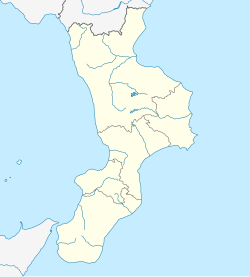Cutro
Cutro
Kytèrion (Greek) | |
|---|---|
| Comune di Cutro | |
 The Chiesa Madre of Cutro | |
| Coordinates: 39°01′58″N 16°58′57″E / 39.03278°N 16.98250°E | |
| Country | Italy |
| Region | Calabria |
| Province | Crotone (KR) |
| Frazioni | San Leonardo, Steccato |
| Government | |
| • Mayor | Salvatore Di Vuono |
| Area | |
| • Total | 131 km2 (51 sq mi) |
| Elevation | 226 m (741 ft) |
| Population (December 31, 2004)[2] | |
| • Total | 10,474 |
| • Density | 80/km2 (210/sq mi) |
| Demonym | Cutresi |
| Time zone | UTC+1 (CET) |
| • Summer (DST) | UTC+2 (CEST) |
| Postal code | 88842 |
| Dialing code | 0962 |
| Patron saint | SS. Crucifix |
| Saint day | May 3 |
| Website | Official website |
Cutro (Calabrian: Cùtru; Greek: Kytèrion) is a town and comune in the province of Crotone, Calabria region, Italy. It holds the name "City of chess".
It is also the birthplace of Vincenzo Iaquinta, a World Cup-winning footballer who played for Serie A club Juventus.
History
[edit]Cutro was a Greek colony of Magna Graecia, with the name of Kyterion.
It obtained the title of city in 1575 by the Spanish King Philip II, after the local chess champion Giò Leonardo Di Bona had won a contest at the Spanish court, become first international winner of chess.
Cutro was destroyed by an earthquake on March 8, 1832. It remained the most populous centre of the region until the mid-20th century, when a strong emigration flow towards Germany and northern Italy (especially in Reggio Emilia) reduced the number of inhabitants considerably.
Population
[edit]The population in Cutro (as of 2017) is 10,575.[3]
Notable people
[edit]- Giovanni Leonardo Di Bona (1st international chess tournament champion)
- Vincenzo Iaquinta (footballer)
- Rino Gaetano (Songwriter, born in Crotone, from a Cutro family)
References
[edit]- ^ "Superficie di Comuni Province e Regioni italiane al 9 ottobre 2011". Italian National Institute of Statistics. Retrieved 16 March 2019.
- ^ "Popolazione Residente al 1° Gennaio 2018". Italian National Institute of Statistics. Retrieved 16 March 2019.
- ^ "Data Commons"
External links
[edit]




